#European gods in Chicago but then like
Explore tagged Tumblr posts
Note
if you could typecast the grid as stereotypical americans who would be who? (idk if i'm making any sense) but for example bezz gives very cali stoner energy.
god this one is hard because they are all so stunningly european. truly. american men do not act like that. the jean tightness alone. ummm. okay let’s start with the easy ones
pecco: pecco is from a suburb like three hours from chicago and he tells everyone he’s from chicago. framed bulls jerseys on the wall etc
pedro acosta: someone said baseball player from north carolina and yeah. i can imagine bumping into this guy at cookout. like he’s giving charlotte/macklenberg county. serving gastonia. he went to nc state with my friend thomas and he has strong basketball opinions.
bez: califoniaaaaa you’re right. of the surfer or skater variety… either way he’s in baggy as fuck clothes skulking around outside kicking it whenever he can. eating a sandwich
vale: new jersey. my trashy italian american clown princess
mav: screams boston 2 me
aleix: too european im being real. insane amounts of european. kind of breaking my brain sooo im not assigning him one
enea: gay ass san fran guy with his lil dog. walkin around the castro the dog gets hot. he picks up the dog. gay pride flag in the background. i cheer. he’s drinking espresso that costs fourteen american dollars. that’s like 12.50 euro google is telling me
casey stoner: this bitch is from vermont
luca: right across the river from vale in new york citayyyy… i think he would thrive in an environment where he doesn’t look insane wearing something very elegant and a lil dressier. like you can’t really do that in idk. most of the south or midwest or southwest or— anyways we’re sending him to nyc
jorge martin: i COULD see him hanging out in florida but like slutty florida not trashy florida. just on a beach in miami in the tiniest shorts imaginable with aleix comma also there europeanly. idk
joan mir: LOUSIANA. need to take his pissy ass to the bayou.
jack miller: attended the university of alabama and was perhaps too invested in SEC football culture. i would end this by saying roll tide for comedy but that would make me gag here in real life. anyways
marc and alex. hmmmmmmm. i could see outside austin texas as that seems 2 be hallowed ground for marc lol. alternatively. kentucky. horse boys. this is another hard one i’m open to suggestions here cuz nothin is jumping out at me tbh
franky: seems into mindfulness in a way that is giving seattle. runs a bookstore with REALLY good staff picks. big ass armchairs HUGE used book section that smells good. sitting there petting the store cat in a flannel with the sleeves rolled up. sipping his coffee. works nights at the local bar sometimes. who said that.
brad binder: denver.
#a mix of cities and states alas i am not perfect#PLEASE fellow usa people give me ur thoughts on this quote a few stumped me#motogp#callie speaks#asks#like truly you guys. you get called gay if you’re a man wearing a turtleneck here it is a different vibe.
64 notes
·
View notes
Text
AIRPORT TIERLIST OF AIRPORTS I’VE BEEN THROUGH FROM SOMEONE WHO FUCKING LOVES AIRPORTS
S TIER:
- MCO Orlando. My love my queen. Platonic ideal of airports. All the other airports wanna be her.
- MSY New Orleans - I have only seen your beautiful face once but your vibes were just impeccable. I miss you beautiful
A TIER:
- LHR London Heathrow - you’re so chill and sweet to be such a major airport. Weirdly calming somehow. Sterile, but the big boy of London airports. When you’re here you’re in London. Smells like joy.
- CDG Charles DeGaulle Paris. Dripping in stunning retro futurism and has a Concorde on stands by the runway. We love her
- DCA Ronald Reagan Washington DC. So pretty. So clean. So easy to navigate. Prevented from S tier status by being one long skinny thing with no way to get quickly across it.
B TIER:
- DEN Denver Colorado. Architecture for the gods but somehow the vibes are off. I’d fly through you again happily but I don’t feel especially warm when I think of you.
- FLL Fort Lauderdale - Hollywood. You’re permanently attached to very warm memories for me because of the trip I took from you but you’re just kind of there. Vibes are off. Meh.
- ORD Chicago O’hare. Aesthetic perfection but weirdly stressful. While I had a great time on this trip I do not think warmly of the airport other than the rainbow lighting. Jules got yelled at here. -10 points.
- CLE Cleveland Ohio. Another airport that is home of warm memories due to loved ones but just really not the vibe as an airport.
C TIER:
- LGW London Gatwick. I don’t like you for no reason. Like a disappointment, you’re in London but not at Heathrow for some reason.
- PHL Philadelphia. Again, weird aimless dislike. I cannot justify.
- BNA Nashville. Meh. Fine, which may be the worst insult I can lob at an airport.
D TIER:
- LGA New York LaGaurdia. Fuck you and your tiny spirit terminal in the middle of nowhere and your hard to access rental cars and your poor road signage that sent me round and round on the New York interstate in my rented Corolla. The bigger terminals are pretty though, and anyway. New York City!
E TIER:
JAX Jacksonville. Ew.
F TIER:
BOS Boston Logan International Airport. I loathe you. Less busy numerically than ATL and yet somehow even more spread out. Signage is bad. Directions unclear. Nothing makes sense in this alternate reality. Labyrinthine building designed by the god Hades. Never again would be too soon.
UNTIERABLE:
ATL - Hartsfield Jackson Atlanta. The biggest and busiest airport in the world. When you buy a ticket on Delta a box pops up that says “by buying this ticket you agree to see the inside of Hartsfield Jackson Airport.” Not actually a real place, but a floating parallel dimensional space you enter when you walk through the doors. When you get off the Plane Train at terminal D a sign to the left points down a hallway and says “Walk to Terminal E. Time: 45 minutes.” Bigger than many cities and some European principalities. And sometimes you’ll be forced to run clear across it when your gate gets changed. Send every domestic flight that goes near it and many that don’t through it for a completely unnecessary 45 minute layover and sautée until golden brown to birth this unholy god of a space outside all time. They have CPR training machines. They have bathrooms too rarely. They have a whole other airport underneath for international transfers. Don’t die before you see it. Everyone should, at least once. 🎶Welcome Aboard the Plane Train!🎶 next stop: the 4th circle of hell. Walk to purgatory: 45 minutes. Moving sidewalk out of order.
29 notes
·
View notes
Text
Fact: Haechan was totally my bias tonight, I couldn’t take my eyes off of him like oh my god the way he moves is just mesmerizing and hearing him singing live has me fully like 😍
And Jaemin!!!! I swear the entire city of Chicago loves him, every time he was on screen or speaking everyone screamed so loud (I don’t blame them), and he did his entire ending ment in English which was so good!!!
I love all of the dreamies and I absolutely hate that the concert is over and it’ll be god knows how long before I get to see them again, but they kept promising to see us again very soon and that the album is coming with a cute and sexy sorta Hello Future vibe, and I kept waiting for Mark to drop the date because he kept teasing us with talking about the album.
But now it’s over ☹️ and they get to go home and rest for a bit before the European leg of the tour at least
Also I handed out all of the bracelets I made, which I’m so happy about and I got compliments on them, on my hair, on my shirt and my photocard holder which I made so I was like so happy ☺️☺️ everyone is so sweet and awesome, and there’s one girl that was handing out her fanart of Mark and it was so so so cool and I’m so glad I got a little copy of it
#10/10 I recommend going to kpop concerts if you haven’t yet gotten the chance you need to try to if they come anywhere within your general#vicinity because it’s always so fun and so worth it#my mom really doesn’t even like kpop and she enjoyed both tds2 and tds3 now#I asked her who her favorites were and she said Mark (which i figured) and she admitted it’s because he speaks English but she also just#likes him and she likes chenle#she also remembered jeno from last year
22 notes
·
View notes
Note
usamerican exceptionalism roleplay:
op-from-latin-america: has anyone noticed how americans keep talking like they’re the only ones who experience (insert common universal experience in countries/cultures)
reblogger-from-the-usa: Um . okay lets just unpack this i dont think op realizes how minneapolis is soooo different from chicago and like (a tirade that’s missed the point)
op-from-latin-america: that’s not what i was saying and also ur kinda proving my point. sure you have it but it’s not uniquely american and also the amount of diversity is less than, say, other countries
other-reblogger-from-the-usa: God europeans love to be so fucking annoying
op-from-latin-america: … im not from there
If you told me this was a real conversation on this site I would believe you.
They are always the first ones to generalize other countries and sometimes even continents (see: Europeans, Asians, Africans, latinoamericans), yet god forbid you dare imply someone from New York and someone from California are similar. And the assuming everyone who criticizes them is European thing is so true


11 notes
·
View notes
Text

video feat. Christopher Walken and Thomas Ian Griffith
kissed by a vampire p2
"Thomas moves like a panther. He exudes a sexuality that can overcome the grave," declared producer King. "We wanted somebody incredibly handsome whom we could decay and would still have charisma. I was sitting in my office when a shadow filled the doorway backlit by the Southern California sunshine. One of the things I look for in casting is how other people react, and when Thomas walked through that door, everybody went, 'Whoa!' Men and women alike. Women, of course, offered to follow him home. Men said, 'God...’
The tall, athletic, highly attractive vampire masters wore the kind of clothing one would see at an after-hours club. Sexy, suited men; women dressed in gauzy fabrics that add movement when they attack. Thomas Ian Griffith's Valek wore a textured velvet duster length coat that draped sensuously from his 6'5" frame.
While Team Crow suffers in this motel sequence, it was no picnic for the vampire actors who were buried alive for a scene in which Valek and his followers take refuge from the hunters in a dry riverbed. "I wasn't happy that day, I'll tell you that," admits Griffith. "I'm a little claustrophobic, and they told us we'd be buried. We were only down a foot, but you have no idea how heavy a foot of dirt is. When it's up to your neck, you're thinking, 'I can't breathe.' And then they cover your face and are timing the sequence before you can come up. I thought, 'You're Valek. Don't let it bother you.' But I couldn't breathe, and it was a bizarre situation. "Thank God I'm the master vampire and I got to come up first," Griffith continues. "Everyone else had to wait. When we did it, we did the master shot first and then my close-up coming out of the ground. I didn't have to do it anymore, so I watched them shooting the other vampires. That was a tough day, although I hear it looks great. Troy wasn't happy that day either; he was one of the last people up."
Like many screen vampires before him, he has a way with women. "He gives an interesting bite to [actress] Sheryl Lee - it's below the waist... a lot of girls in the [test] audience started applauding." Carpenter said, laughing.
"Villains are always fun. The characters I play in KULL and VAMPIRES are so different. I'm such the leading man that getting these character roles is great. As an actor, I love to mix it up." (TIG)
"Southwest Gothic is the look of the film. The flavor of the vampires comes from the European Middle Ages around the time of the Crusades," explained producer King.
sources: John Carpenter's Vampires, Production notes, Chicago Sun-Times, Fangoria Mag "He's a great Vampire. I think he's one of the best since Christopher Lee." (John Capenter about Thomas at the Special Screening of Vampires 1998)
29 notes
·
View notes
Text
Thinking About JCS Too Much, Vol. 1: "Jaded Mandarin" - Lost in Translation?
Intro
In my second attempt at an introduction for this blog, I pondered aloud, "Ever wonder if you’re too big a fan of your favorite piece of entertainment?" Suffice it to say, that is far from the only time that thought has crossed my mind.
You see, unlike many faded celebrities attempting to jump-start their careers afresh by "finding religion," I followed the opposite path. I don’t remember hearing about God, Jesus, or anything like that before a certain age. I was about 4 when I first started becoming aware of religion. Something related to Christendom spawned a cover story in Time magazine, and they had this beautiful traditional artwork of Jesus on the front that caught my eye. I became obsessed with religion in general, and the Christ story in particular. (Even today a lot of my extracurricular reading is devoted to religious fiction and non-fictional religious studies, and the shelves of my film collection are strewn with biblical epics, both Old Testament and New. I’m by no means invested in the Abrahamic faiths -- in fact, I'm now an avowed atheist -- but I won’t deny that I’m very knowledgeable about them.)
This obsession led me to Jesus Christ Superstar, and so my life as a show biz professional, and my switch from a special interest (yay, spectrum!) in religion and the surrounding scholarship to one in a single telling of a story that happens to deal with religious subject matter, began.
Naturally, this has led to a few embarrassing incidents of over-thinking where I nerd out just a little too much, primarily from a literary perspective. (Case in point: my answer to a recent question posed to this blog about the lack of a detail from the biblical story in the show. Did I need to go "all in" on whether or not Jesus was actually prophesying that Peter would deny him three times by the time a rooster crowed? Probably not. Did I anyway? Oh, c'mon, you've read it by now, don't make me relive it.)
So, in a similar vein, I'm going to periodically write about those moments where I nerd out too much, in hopes that my immense nerdiness will maybe give someone a deeper understanding of the show, even just a small part of it. You've seen one, thanks to an inquiry from an anonymous fellow fan; after the jump, here's another.
Translation vs. Adaptation
Among the many unique features of JCS, it was one of the first musicals of its kind to be widely adapted into the local vernacular when presented internationally, rather than merely importing an English-language cast as the custom used to be.
Besides its mother tongue, JCS can (theoretically) be heard in:
Czech
French
German (anecdotally, it has been reported that the German translation is not the best, which is why many productions in German-speaking countries opt for the English instead; however, that might be about to change, as the production at the Luisenburg Festspiele Wunsiedel this summer is supposed to mark the debut of a new authorized one -- we'll see how it goes!)
Hungarian (there's two Hungarian ones, actually)
Japanese
Polish
Portuguese
Romanian (in a translation recently debuted in, of all places, Chicago)
Russian (there are several, both official and unofficial; we will deal with all of them today)
Spanish (both the European variety and two Mexican ones)
Swedish (at least two that I'm aware of, the original and whatever Ola Salo uses for productions involving him)
(And those are just the ones I know about.)
While I appreciate JCS most in its original language, being a native English speaker myself, I realize translation and adaptation are important, for all the reasons that they usually are: not everybody speaks a foreign language with dexterity, or is capable of processing it at the pace a play or musical is performed; almost without exception, people respond better to the language they grew up speaking, especially in a piece of entertainment; and, most importantly, translation allows ideas and information to spread across cultures, sometimes changing history in the process. (After all, no matter what your religious belief, part of the reason the Bible -- the show's source material, as if you needed a reminder -- has had such an impact on history is the sheer number of translations, which, at last count, is 531 languages.)
However, translation into any language (pro or amateur) is a delicate art, especially where a play or musical is concerned. As Don Bartlett, who has translated Danish, German, Norwegian, Spanish, and Swedish books into English, put it in a piece where several translators were interviewed for The Guardian, “There’s always a tension between being true to the original and being readable.” On the one hand, translating the meanings of words and phrases in a literal way maintains fidelity to the text; on the other, translating sense-for-sense, taking into account the meanings of phrases or whole sentences, can improve readability. And that’s just books… imagine doing this for theater or film!
Personally, I subscribe to the assessment of Edith Grossman (also interviewed in the aforementioned Guardian piece), who once said: “…the most fundamental description of what translators do is that we write — or perhaps rewrite — in language B a work of literature originally composed in language A, hoping that readers of the second language — I mean, of course, readers of the translation — will perceive the text, emotionally and artistically, in a manner that parallels and corresponds to the aesthetic experience of its first readers. This is the translator’s grand ambition. Good translations approach that purpose. Bad translations never leave the starting line.”
(Or, to tie this back into our topic somewhat more closely, I'm mashing together two quotes from two different interviews with the late Herbert Kretzmer, the adaptor of such popular foreign musicals as Les Misérables, Marguerite, and Kristina: "Words have resonance within a culture, they have submarine strengths and meaning. If I wanted a literal translation, I would go to the dictionary. Translation — the very word I rebut and resent, because it minimizes the genuine creativity that I bring to the task. [...] I offer this advice to any lyricist invited to adapt or translate foreign songs into English: Do not follow the original text slavishly. Re-invent the lyric in your own words, remembering that there may be better ways of serving a master than trotting behind him on a leash.")
Nowhere is this job harder than JCS, especially in Russian. As languages, Russian and English are just too different from each other, each very rich in emotional shadings that the other language lacks (or at least conveys differently), to a point that nearly every new production of JCS over there has led to a fresh translation. Tim Rice's unusual wordplay, masterful (at times) in English, is very difficult to convey in a foreign tongue, especially when it can be safely argued that the expression in question is hardly common to its native audience.
The Piece We're Evaluating
As if the title didn't give it away, I speak, of course, of a certain insult Judas hurls at Jesus during their climactic argument at the Last Supper, calling him:
A jaded mandarin A jaded mandarin As a jaded jaded faded jaded jaded mandarin
That's a doozy in English, to say the least. I may have written on this blog previously that I’ve heard enough jokes about the Last Supper being at an all-you-can-eat Chinese restaurant or Jesus’ penchant for citrus fruits to be tired of them all.
In case you missed Tim's actual meaning: mandarin is not just a variety of orange, a form of the Chinese language, or a term for an official in any of the nine top grades of the former imperial Chinese civil service (or clothing characteristic of what they’d allegedly wear or porcelain objets d’art depicting them). The root word for mandarin in Hindi means “counselor,” and – unfortunately, given this definition’s origin in unkind Asian racial stereotypes – the term came to refer (in colonialist British parlance) to a powerful official or senior bureaucrat, especially one perceived as reactionary and secretive. When he calls Jesus a “jaded mandarin,” Judas is saying that Jesus is corrupt, washed up, and useless as a leader.
Could Tim Rice have found a better way to say that? Probably. But this is the method he chose, and for better or worse, it has gone down in history ever since, including a recent parodic reference in the second season of the Apple TV+ series Schmigadoon! to a “sour macaroon.”
Now, it took all that explanation to convey its meaning in English. How well do you think it crossed over to Russian? Well, no less than 16 translators decided to try; some were official, others fan translations that were used in little-known productions. (The number should not be surprising. This is very much the viewpoint of an outsider looking in who lived long after that time, but when an album is banned by the government, bootleg copies change hands for huge sums "underground," and the music on that album is in a style also banned by the government… well, let's just say something "forbidden" is going to attract a lot of people. After that initial burst of enthusiasm, then it's like any other piece of literature which is translated a number of times by multiple people -- someone who thinks they can do a better job of conveying the foreign meaning in their native tongue, perhaps in a more modern dialect or a more relevant way.)
Inspired by a conversation I had on ye olde JCS Zone Forum (RIP) with Russian fan Pasha Levcovetz, we're going to take a look at all of them, evaluating them for literal vs. poetic accuracy and also offering opinions on which might have even -- dare I say it -- improved on the original. For the sake of most of my readership, I'll render the Russian in (literal but accurate) English so you can understand what the adapted lyrics intend to say. (Special thanks to Pasha for his help!)
Translating "Mandarin"
As one might expect with a phrase that is not exactly common linguistic currency, and the number of jokes made about Tim's choice of words, the first problem Russian translators might encounter is "mandarin" -- more specifically, whether or not it is a literal reference to mandarin fruit.
Much to both my dismay and my amusement, two of the official translators and three of the fans decided that the lyric indeed referred to the fruit.
In the Teatr Mossoveta production in Moscow, which has been presented numerous times from 1990 to the present (and which made much larger departures that I've previously written about in response to a question from @nemoverne), Yaroslav Kesler rendered it like so:
Like a pitiful tangerine Like a pitiful tangerine Like a pitiful, pitiful, pitiful, pitiful, yellow tangerine!
For the more faithful version recorded on CD in 1992, Vyacheslav Ptitsyn traveled in a similar direction:
Squeezed lemon! You are a squeezed lemon! You are a pathetic, petty, pathetic, petty squeezed lemon!
Lastly, for something that is not a variation on either of the above, fan translator Yevgeniy Susorov gives us:
You are a withered fruit You are rotten, tasteless fruit You are a withered fig tree that will die in the flames!
I can see their intention, and, in my opinion, both Ptitsyn and Susorov improved on the original line, although this was probably coincidental in the former's case.
As far as Kesler is concerned, it's more of a vague fruit comparison that sort of makes sense. A yellow tangerine is overripe, and as tasty as overly ripened fruit can be, it's prone to developing patches of mold, and goes bad when left uneaten for too long. The meaning here when Judas applies it to Jesus as an insult should be clear, as he's been saying something like this about him -- metaphorically speaking -- for the entire show. (In the fan category, Vadim Zhmud makes the same choice and is even more explicit about his intentions, rendering the fruit as a "lethargic," "well-fed" tangerine. Mikhail Kokovikhin's take also chooses "tangerine," but gets caught up in trying to use it in exactly the way Tim uses "mandarin," repeating the word for emphasis and relying on the fact that Russian has three different synonyms for the word "rotten" to pad out the stanza. There's nothing wrong with trying to match Tim's choices as closely as possible, but just calling someone a rotten fruit in all the ways one can is a little weak.)
Ptitsyn's is more intriguing, partially because of a (likely) unintentional double meaning. If you recall, he refers to a pathetic lemon that has had all the juice squeezed out of it. In American English, in addition to referring to the fruit of the same name, "lemon" is also used to refer to a product, usually an automobile, that has flaws -- like manufacturing defects, in the car's case -- too great or severe to serve its intended purpose. (To cite a more abstract usage, the late Jim Steinman aptly used the "lemon" analogy in the Meat Loaf song "Life Is a Lemon And I Want My Money Back.") In Russian, the phrase "squeezed lemon" similarly refers to someone very tired, a person who has lost their strength or abilities. Poetically speaking, Judas calling Jesus a "lemon" at this moment has an extra layer of meaning that works really well in either language.
Lastly, my favorite (if only as an atheist theologian) is Susorov, who doesn't just spin the line into a much better fruit metaphor -- he even gets biblical with it, referencing both Jesus' teaching about "trees bearing bad fruit" and also one bad tree in particular that figured into Jesus' final week in the original Passion narrative.
Quoting loosely from the King James Version of Matthew's Gospel (an incident also recounted in Mark, chapter 11): "And seeing a fig tree by the wayside [Jesus] went to it and found nothing on it but only leaves. And he said to it, 'May no fruit ever come from you again!' And the fig tree withered."
In Susorov's text, Judas is not only condemning Jesus as the tree bearing bad fruit against which he preached, but also comparing him to a specific, very recent failure that might still sting.
(Susorov's choice is made even more ironic by the fact that Lloyd Webber and Rice intended to musicalize this moment in JCS themselves, but ultimately decided to cut it from the original album when concerns of length were raised, as previously discussed here. If that scene was still in the show, this would be quite the burn!)
Getting at the Meaning
Moving away from the poetic toward conveying the lyric's literal intention without getting bogged down in language, both official and fan translators seem to settle for general insults, so it becomes a different question: whether they are just that (i.e., general insults) or they convey the same meaning as intended by "jaded mandarin."
The latter is achieved adequately by Viktor Polyak (Yaroslavskiy Gosudarstvennyy Teatr Yunogo Zritelya, 1989-1994):
You are a crashed idol You are a crashed idol You are a crashed, broken, dirty idol!
It works. The show is called Jesus Christ Superstar; a fallen celebrity metaphor is far from out of place. Maksim Samoylov, in the fan department, goes for a similar take, having Judas call Jesus a "little, fallen star."
Svetlana Peyn, whose translation has appeared at Stas Namin in Moscow from 2011 to the present, is on a similar wavelength:
You are a pompous hero You are a pompous hero With poisonous loud glory you are a self-important pompous hero
Ouch!
Mikhail Parygin, a fan translator, is in the same boat, going for "a [...] pathetic, petty, pompous king." Likewise Andrey Voskresenskiy, with "a [...] surrendered, fallen, finished prophet," and Vera Degtyaryova, who settles for "a miserable [...] former leader." Also rather close is Aleksandr Butuzov, who has Judas call Jesus "a loser" and "a mediocre, brainless, stupid leader." Though Russian fans I've spoken to don't especially care for his choice of words in their own language, it's on the mark as far as literal meaning goes.
Another official translation is not quite in the same realm, but close enough to make sense. Specifically, Grigoriy Kruzhkov and Marina Boroditskaya, holding the pen for the St. Petersburg Rock Opera State Theater in an adaptation which has been produced since 1990, provided:
Like a rebel! Like a simple rebel! Like a deceiver and a thief! Like a self-proclaimed king!
Metaphorically speaking, if you squint at it, it looks similar; full-bore insults that at least fit the plot.
Things get a little more interesting when translators move farther afield. For example, on the official front, Valeriy Lagosha's version for the "Free Space" Theater in Oryol, which ran from 2003-07, is:
No, I do not want this, prophet I do not want this, prophet After all, in this life I was able to do much more
It's an interesting idea to follow Judas' suggestion in "Heaven On Their Minds" that everyone would be better off if Jesus had not become famous and reinforce that point.
On the fan front, Kirill Sukhomlinov chooses to turn Jesus' biblical language about the religious authorities back on him:
You are a pathetic hypocrite You are a pathetic hypocrite You are a pathetic, pathetic, pathetic, pathetic, nasty hypocrite!
And Maksim Zakharov doesn't really hit on the exact idea, but manages to create something that at least fits the character and situation:
You are a dark person You are a terrible person I am glad that you will end your life in prison!
Conclusion
Will there ever be a perfect translation? The jury's still out, especially -- it would seem -- in Russian. (There are more examples just from Russian translations to talk about that I will contemplate in future posts.) But it's always fascinating to view a piece from someone else's perspective, isn't it?
#jesus christ superstar#andrew lloyd webber#tim rice#jcs#jesus christ super star#jesus christ super-star#jcss#jcs study
11 notes
·
View notes
Text
Nine People I'd Like to Get to Know Better!
Thank you to @prettypearlypisces and @xjoonchildx for tagging me!
Last Song: Overcompensate by Twenty One Pilots. But I'm currently in my Hozier girl era.
Favourite Colour: Yellow and Purple. But like Sunflower, Sunset, almost golden, deep rich yellow. And then Royal purple, like velvet and violet eyes.
Spicy/ Sweet/ Savory: I am the type of white who's spice level remains solidly at milk being my limit so I'm definitely a sweets first savory second, spice somewhere past dead last kinda person. But my sweet tooth is horrible. So, sweet!!
Currently Watching: AHAuhhhhhhhhhhh. I restarted Queen Charlotte. Me and my partner have been on and off watching Spy X Family. I cycle through my 5 comfort shows (X-files, Buffy, Gilmore Girls, Greys and Criminal Minds). And the last new show I finished was "Ready, Set, Love" which was a Thai(?) drama and super good!
Realtionship Status: Taken! 5 years almost 6. But also not above calling Min Yoongi my husband and Ari (darling moot) my wife. So...Very taken XD
Current Obsession: Planning my first ever european vacation. Dramione fanfiction (somebody help me oh my god it's all I read. theres SO MANY fantastic stories), fanon Draco Malfoy (iykyk), audiobooks, starbucks strawberry acai refreshers with lemonade, frogs, chicago mix popcorn, washi tape, i can keep going i have many.
Tagging (no pressure): I'm super late to this so i have no idea who has and hasnt been tagged SO: @katykatmeow @remmykinsff @leohatter @notpedeka @yoongicatagenda @petasse02 @poptartsandpopstars @bangchanbabygirlx and @aliimac
11 notes
·
View notes
Note
3 and 15 for the asks!
15. Something you learned.
I've read up on various ailments that I've never personally had. For Sunset, hypothermia (just to make sure they weren't really at risk of it) and the most common injuries when getting hit side on by a car (pelvic fracture among other things) and the rehab outlook for them. For ATG I spent hours and hours looking up obscure sport rules to see whether Achilles could be blocked from competing ever again. European track and field websites don't have reliable upkeep. so many dead links.
3. A favorite scene.
Again, Aphrodite's scenes were all my favorite, so here's her last appearance in Sunset:
The crunch of glass under shoes shatters the perfect quiet. Her words that echo in the street are almost moaned. “Gods, that’s the good stuff.”
The goddess’s approach is slow and measured. This was her doing. Her game. “I mean, nobody does it like you,” she drawls, “Nobody.” Achilles looks away, down at Pat’s slack face. He is dead because of her, and because of Achilles.
“You do look good on your knees,” she says when she is directly in front of him. She towers over them, twice as large as a mortal woman, pupils so wide and black they are swallowing even the whites of her eyes. Aphrodite runs her tongue over her teeth.
“Let me die,” Achilles says, his voice hoarse, but she does not listen. She does not need to. She is a goddess, and she will do as she wills.
“Don’t tell me you can’t taste that.” Aphrodite kisses the tips of her fingers and spreads them in the air before she trembles, starting at her knees and moving up to her shoulders, tossing her hair, a whole body shudder of pure ecstasy. “The people of this age know nothing of passion. They bottle everything up, hide it away, sublimate it. Not you, though, no. You express everything with such open… vigor.” Aphrodite bends down low, and Achilles clutches Patroclus closer, as if he can protect him from her now. She reaches forward and twists a lock of Achilles’ hair around her finger, bringing it to her nose to inhale the scent. “Gods, I would bottle this up if I could. Take a hit of every morning.”
Achilles presses his hand to Patroclus’s cheek, willing the warmth not to leave it. Patroclus’s head lolls; blood smears across Achilles’ arm. “Let me die,” Achilles begs. “Please.”
She tsks at him. “Those weren’t the terms, darling. Sweet Pat there just threw himself in front of a car to save your life. I think it’s safe to say you did an excellent job winning his love, don’t you? That means you get to stay in lovely, snowy Chicago.”
Achilles squeezes his eyes shut and holds him tighter. Let him die. Let him die right here of a broken heart, holding his Patroclus. Let their bodies freeze together in this icy hell and never be used by gods or men again.
“Mmph, I can feel it radiating off of you.” Aphrodite’s fingers pinch around his chin. His face is tilted up as she gives it a squeeze. “I’d keep you like this forever if I could. My little battery of passion. But no,” she sighs. “Passions must flare and subside like the tides for them to be any good at all, and even I can overindulge.” She lets go of his face with a shove. “And, if I leave you like this, you won’t be long for this world at all. Always the risk with men like you, always burning themselves out. Just look at what you’ve done to Pat’s home.” She gestures at the intersection, the glass, the sparks, the cars that have crashed into each other and into the traffic poles. “I can feel that you would even try your luck killing me right now with your bare hands if you could bring yourself to let go of him, if only in the hopes that I would kill you where you stand.”
He does want her dead. He wants her gutted, her godly ichor washed aways with the snow and dirt in the gutters of this place, but he does not want that more than he doesn’t want to leave Pat in the filthy slush of the road. He rubs a smear of blood off his cheek. He can’t let him go. He can’t leave him here. “Just kill me,” he whispers, but she is not listening.
Aphrodite stands to her full height and stretches, her hands high in the air, then she shakes her hair out. “It was absolutely worth dealing with this city’s abysmal weather for this. Oh, I’ll be tingling to my toes for weeks. I simply must do more capers. Maybe I’ll bring back Lancelot next. Or I could pluck Zhinü from the sky, now she was the type to move the heavens for her love.” She taps her fingers against her cheek as she returns to considering Achilles. “But as for you” –she bends down again, her face very close to his—“It would such a shame to lose all this, mmm, energy you put out.” She reaches a hand down to stroke Pat’s face, and Achilles shudders in revulsion. “And he is such a pretty one, isn’t he?”
7 notes
·
View notes
Text
Moor Mother — The Great Bailout (ANTI-)
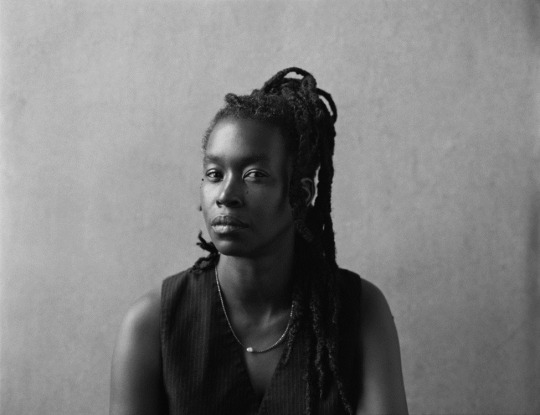
Photo by Ebru Yildiz
Camae Ayewa, aka Moor Mother, has a genuine claim towards being one of the busiest artists working today. Over the past five years she has taken part in more than ten albums, with sounds spanning unpredictable hip-hop experimentation to free jazz odyssies. The Great Bailout represents yet another left turn, taking sonic inspiration from glitch and concrete poetry and working with noise veterans such as C. Spencer Yeh and Aaron Dilloway to put together something truly haunting. On this record, Moor Mother bears witness to centuries of violence, death and horror at the hands of European colonialism and white supremacy. She spits its debris back at the listener and forcing us to contend with our ability to remain nonchalant in its seemingly never-ending cycle.
The first thing heard on this record is not Ayewa, but rather the intonations of Raia Was and Lonnie Holley over the twinkling harp of Mary Lattimore. Was’ fluttering vocals could not contrast more with Holley’s powerful warble, but both convey the dread and weariness that come with continuing to survive in a society that offers nothing but death in return. Three minutes into the track, Ayewa sets the scene for the rest of the record: “Taxpayers of erasure, of relapse, of amnesia, paying the crimes off.” This is perhaps the condition of being an everyday citizen, living in a state that never shook off the ghosts of colonialism, if it ever even tried in the first place. On “ALL THE MONEY,” over an ominous dub-inflected beat, Ayewa lists off British national landmarks and the years they were established, building up to the British Museum, one of the world’s largest resources of stolen cultural landmarks. “They heard about the kingdoms of gold,” Ayewa states. “They heard about the books of mathematics, philosophy and rituals.” The title of the album could be interpreted a number of different ways, but in this context it is clear that Europe stole so much from Africa to bail out its own moral and spiritual failures.
One of the highlights of the album is “LIVERPOOL WINS,” which features Aaron Dilloway contributing a typically clattering, ugly backing track. “Payouts, bailouts, just enough to build the city, a country, an infrastructure, a financial revolution, a stronger christianity, a whiter God, a period of enlightenment,” lists Ayewa. “Who builds death like this?” This question resonates through the entire record. Towards the end of the record “SOUTH SEA,” featuring the contributions of Chicago jazz mainstay Angel Bat Dawid and her vocal group Sistazz of the Nitty Gritty, feels like a requiem for what’s been lost, both material and immaterial, in the fray of colonialism. “How many have to be slaughtered in front of you before you choke on your own tears?” Ayewa asks. “Before your brain convinces you that you are already dead and if you are still breathing, you shouldn’t be?” It’s difficult to listen to these questions without thinking of horrific images from Gaza, Sudan and the Congo, all of which are stark reminders that the same forces that bailed out Europe are continuing to fuck up the world to this day. There isn’t a singular, clear message of hope on The Great Bailout, but in documenting the rage and despair built into life under such a ugly and evil system, Moor Mother has provided something just as valuable — if not more so— in understanding the struggles of the present day.
Levi Dayan
#moor mother#the great bailout#anti-#levi dayan#albumreview#dusted magazine#Camae Ayewa#hip hop#free jazz#spoken word#lonnie holley#Raia Was#mary lattimore#aaron dillaway#angel bat dawid
2 notes
·
View notes
Text
Honoring a Trailblazer: Dr. Harriet Rice, Class of 1887, the first African American woman to graduate from Wellesley
Cleo Hereford ’09
As presented by Hereford during the Wellesley Alumnae of African Descent Annual Meeting on Sunday, June 25, 2023.
____
During this year’s annual meeting, we wanted to highlight a true trailblazer - Dr. Harriet Rice, the first African American woman to graduate from Wellesley College. Rice was born just one year after the Civil War ended in 1866 in Newport, Rhode Island to father George, a steward for the Newport Steamship Company and mother Lucinda. A talented student, Rice achieved the highest class ranking in Greek at Newport’s racially integrated Rogers High School. After graduating in 1882, she matriculated at Wellesley a year later and was one of only three black students. One can only imagine what it was like to be a black woman at Wellesley during the 1880s but College archives do provide some insight. In 1935, the Alumnae Association sent Dr. Rice a biographical sheet asking about physical or other handicap to which she responded “Yes! I’m colored which is worse than any crime in this God blessed Christian country!”

Nevertheless, she persisted.
After receiving her degree from Wellesley in 1887, Rice, following in her brother’s footsteps, earned a medical degree from the Women’s Medical College of the New York Infirmary for Women and Children in 1891 at a time when few women pursued medicine. She then sought additional training while interning at the New England Hospital for Women and Children. Her advanced medical training is especially notable when one considers that up to 1904 only half of all medical graduates of any race or gender received postgraduate training making Dr. Rice a highly qualified physician.
As expected, given the post Reconstruction time period, black physicians faced rampant racism and discrimination often relegated to only working with black populations while female doctors, including white women, were often denied appointments at hospitals due to gender based discrimination. Rice was amongst only the second generation of black female physicians but also female physicians in general in the country. (For those interested, Rebecca Lee Crumpler was the first African American woman to become a formerly-trained physician receiving a medical degree in 1864). By 1896, there were just 115 Black female doctors in the country.
Despite this, she forged ahead determined to be a successful physician. Though largely prohibited from practicing medicine in any American hospital as an African American woman, she found a way to utilize her skills providing medical treatment and care to low income individuals at Hull House, an organization offering a variety of social services, on Chicago’s Near West Side. It was in Chicago where Rice worked alongside famous social worker, women’s suffrage leader and first American woman to receive the Nobel Peace Prize, Jane Addams. Much different than the Chicago we know today, however, only 1.3% of Chicago’s population in the 1890s was black and Rice faced discrimination, particularly from Hull House’s white European immigrant clientele (black residents were limited to residence on the South Side, far from Hull House). Further, working at the settlement house offered little in the way of financial compensation, upward mobility or recognition for Rice; at one point, she was listed as a secretary at the organization when she was in fact running the medical clinic. Rice sought other professional opportunities and, in 1897, she became the only doctor at the Chicago Maternity Hospital and Training School for Nursery Maids providing obstetric care.
After years working in the medical field in Chicago and later Boston, Dr. Rice opted to serve on the frontlines as a military physician for three years during World War I. Throughout the war, which lasted from 1914 through 1918, women of color contributed to the effort both as individuals and through organizations such as the YMCA. At the start of the war, Rice attempted to join the American Red Cross effort to provide medical services to American troops but was ultimately denied because of her race. Again, she persisted contacting the French government who leapt at the opportunity to have an experienced medical doctor available to treat French troops. Joining the effort at 49 years old, Rice served on hospital duty in France from January 1915 until just after Armistice in 1918, longer than most American troops. This period in Rice’s life finally afforded her the opportunity to both practice medicine and be recognized for her work, opportunities that had previously alluded her. As a result of American racism, she made important contributions to the Allied war effort, not under the American flag, but the French. In 1919, Rice was awarded the Medal of French Gratitude at the French Embassy in Washington, DC for outstanding service in French military hospitals treating wounded soldiers. The medal was specifically created to express gratitude by the French government to non-military participants who, in part, had performed an act of exceptional dedication in the presence of the enemy during the war. After returning home, Dr. Rice continued to work in medicine before retiring in West Somerville, MA.
Dr. Harriet Rice, Class of 1887, passed away in 1958 at age 92 in Worcester, MA and is buried in Newport, RI alongside her parents in the God’s Little Ace section of the Common Burying Ground. She is remembered as “a woman of valor.”
Sources:
Dr. Harriet Rice, Class of 1887 (Davis Museum)
A Woman of Valor
American Women Physicians in WWI
History Bytes: Dr. Harriet Alleyne Rice
Who was Harriet Rice? (Jane Addams Hull-House Museum)
Dr. Harriet Rice: First Black Resident at Hull House
7 notes
·
View notes
Note
[23 year anon]
Damnit I had a long ww2 anon that didn’t go through because the app crash. But I was pointing out why decolonization in the Americas never made sense to me because well I’m a African American
My genes are mostly African like the desire to eat mud that later became cornstarch when we moved up north. Also I’m a midwesterner (Chicago area, but never raised in the ghetto) who was born in a small college town and lived in the south (NC) for a few years. My mother tongue is English, my culture is predominantly Anglo Saxon with black culture being a mutation of poor Europeans in the south and baptism
What I actually do the research
My only connection to the old world are the chains my ancestors were put into. Which is why I envy Europeans, Indian, First Nations, and Asians Americans who still have their culture roots
Also the more I learn about African cultures the more I realize how bs pan Africa is
Black activist American wearing designer clothes, a have Rolex watch, Nikes, and the latest iPhone: White people took my culture roots
Native African who have to deal with tribal conflicts that the cia took advantage of and making his birthplace a hellhole: you don’t mess much
Also one thing that cause issues between African Americans vs native Africans is that they have fetishized view of Africa which is the times worse than a white guy because of pan Africa
Black Americans, please a love of god swallow this hard pill. Yes we will never know where our ancestors and tribes from. But those other Africans tribes and kingdoms bastards sold us to Europeans for guns.
But what did those Africans who sold for guns did after going to the new world? Well beside the struggles, we help create and improve inventions like the lightbulb (a black guy extended the life on) we became the forefront of the Industrial Revolution. We help begin the Conquest of the Heavens(space travel) with the Apollo missions while those African kingdoms of bastards fell apart and culture became nothing more than costumes.
Okay sorry for the villain monologue, but I think what would really help approve the African Americans communities is that unless your ancestor or parent came to Africa in living memory. We realize we will never truly be part of the old world
But hey at least we will never known if we are descendants colonizers or inbreed monarchs.
I had a thing written out, but I chucked it.
I think you're pretty much saying what all needs to be said here, other than maybe the various African kingdoms were like that long before the Europeans arrived and the "Scramble for Africa" began, which technically still going on just without the colonization part.
Not sure if I'll ever understand that whole thing, namely how the various countries managed to get and maintain control of areas that dwarf the size of their home territories and actually manage to get some loyalty out of the people in those territories.
I suppose much like what happened in the Americas leveraging existing tribal conflicts helped, what we in the US call the "French and Indian War" was just another theater of the 7 years war in Europe but over here the natives were on one side or the other depending on which tribes the other side liked. _____________________
Imagine what would happen if Africa balkanized, it would be insane.
Probably not good insane either.
3 notes
·
View notes
Text
Michael Christopher Kelso (born August 28, 1959), the Familial Lore…
He's the son of John Fletcher Kelso III (born 1930), and Eileen Victoria Casey (born 1932), and is the third of seven Kelso children…
John "Jay" Edward Kelso IV (born 1954): Description further down. Casey George Kelso (born 1956) Michael Christopher Kelso (born 1959) Kimberly "Kim" Maria Kelso (born 1961): The only Kelso girl in the family. Like her mother Eileen, she's big-boned and heavy-set. Charles "Charlie" Fletcher Kelso (born 1966): His conception brought the Kelsos from Kenosha to Point Place (where their mother Eileen grew up), since the house in Kenosha was too small. Aaron Samuel Kelso (born 1971): He's deaf, hence Kelso's knowledge of ASL. David "Davy" Thomas Kelso (born 1973): Called Davy because of Davy Crockett. Loves westerns, and loves wearing a little raccoon skin hat.
He's Scottish via his father, and English and German via his mother. His dad's side are the snotty intellectual types with a notorious lack of common sense (stares at Betsy). The Kenosha Kelso branch, Kelso's second cousins, are prime examples of this.
John Christopher Kelso I: Descendants of the other branches (other than via his eldest son John) are known as the Kenosha Kelsos. John Christopher Kelso II: Married Madeline Fletcher, and had only one child. John Fletcher Kelso III: Kelso's father. He was spoiled rotten in Kenosha, but he felt lonely as an only child, so he had a bunch of children with a Point Place native, Eileen Casey (Kelso's mother). He and Eileen lived in Kenosha until Kelso was seven, and they moved back to Point Place. John "Jay" Edward Kelso IV: Kelso's eldest brother, and the only smart Kelso of the bunch. He works as an economist for the Chicago Tribune. The nickname Jay predates Jay from the T9S AU, and I headcanon that T9S Jay's full name is also John.
Meanwhile, his English Casey (hence Casey's name) side is well-known for cousin marriage. And, well, for not being all that bright. His uncle George was mentally impaired, and shouldn't have been allowed to enlist in WWII, but he did anyway, and died in on the European front. His uncle Edward "Eddie," the father of Kelso's cousin Samuel "Sully," lost two fingers in a fireworks accident. He still does some great fireworks shows on Fourth of July (hence why I'm getting into this lore in the first place).
His German side is well known for giving everybody two middle names (his grandmother's full name is/was Maria Victoria Adelaide, the one who loves/d God and bingo), which Kelso thinks is "regal and fancy."
Credit to @jackieburkhrts for Madeline (I forgot, sorry).
#that 70s show#that 90s show#michael kelso#the familial lore#the only other one I have typed out atm
4 notes
·
View notes
Text
I was gonna put it in the tags but fuck it, the last point about cities all looking the same is bullshit. Honestly the fact that there's no graffiti in any of those pictures when we're talking about culture and creativity while complaining that people must have nothing to say is bullshit.
You can easily get a gray, bland picture of a city. For instance, Chicago

Wow look at all those gray boring rectangles. Must be so boring.
In the meantime:

The tower for the Chicago Tribune

The field museum

A random fucking street.
Going through the city makes it impossible to take in every little thing because there's so much of it. Part of the expression and detail in everything is the amount of time periods it lives through.
This is all before we point out that cities are hubs of many different cultures. Chicago has a China town. Plenty of Eastern Europeans flocked to the city in the past and put their roots there. Bronzeville was named as a national heritage area recently for Black history and Black culture. Then there's the Mexican American culture found in places like Pilsen and Little Village.
And here I'm shown I picture of a fucking Church? From a Greek god statue Twitter account? Fuck that return to tradition bullshit. I'm using one specific American city because it's the one I've been to the most, but seeing as how cities specifically have a lot of fucking people from many different walks of life, you'll find plenty of expression in them.
I get the hating current minimalism and gray scale design today. I'm in an apartment with gray walls and gray carpet, some beige for a light switch. I can't change it because I'm only really here for four years, and even then it's not like I own it. While a parent that actually has a mortgage keeps coloring painting shit gray and I hate it (green fireplace? Gray. Brown wood cabinets? Gray. Purple walls? Gray. Its all fucking gray). It's depression design honestly. Minimalism to me also sucks.
But saying that culture as a whole, society as a whole, does not express itself discounts the amazing ways that people find to do just that.
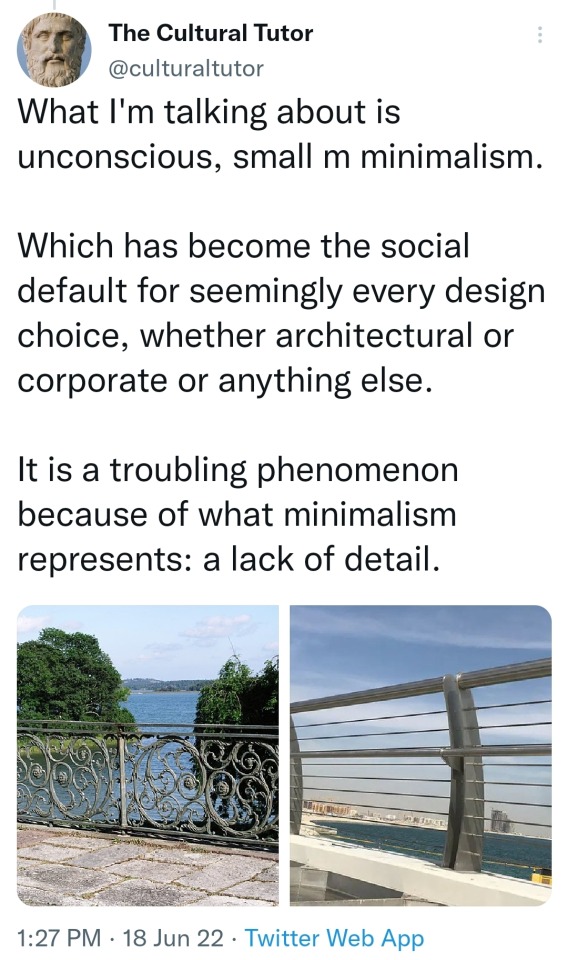
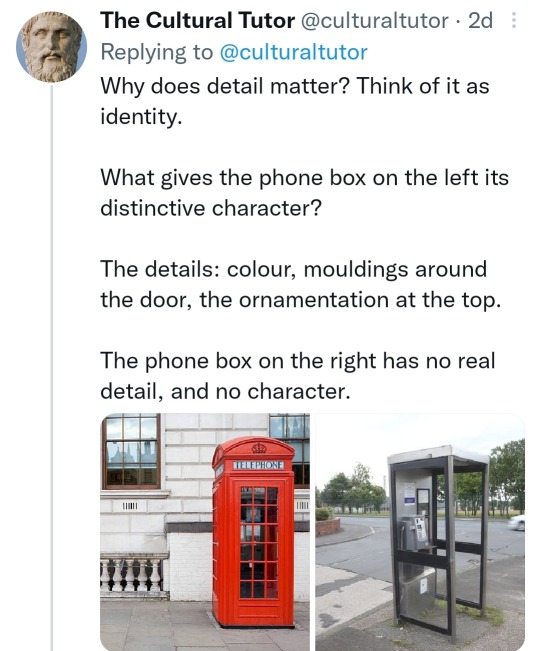


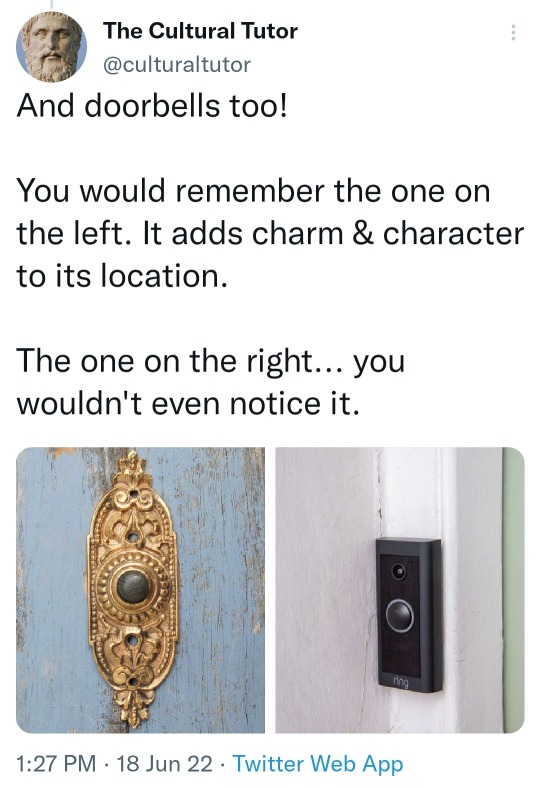
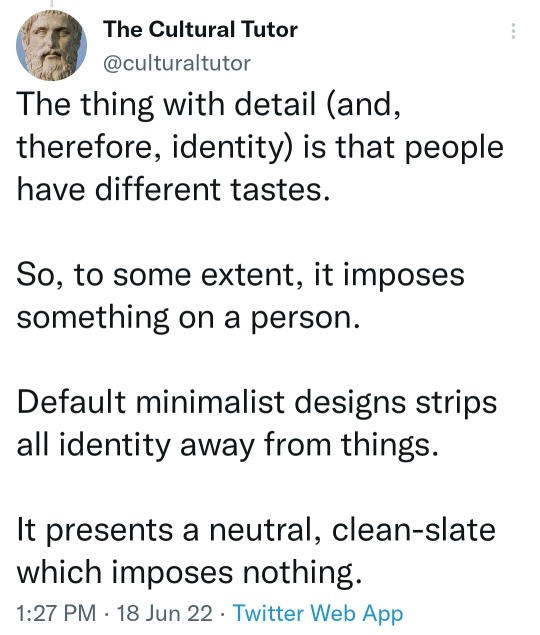
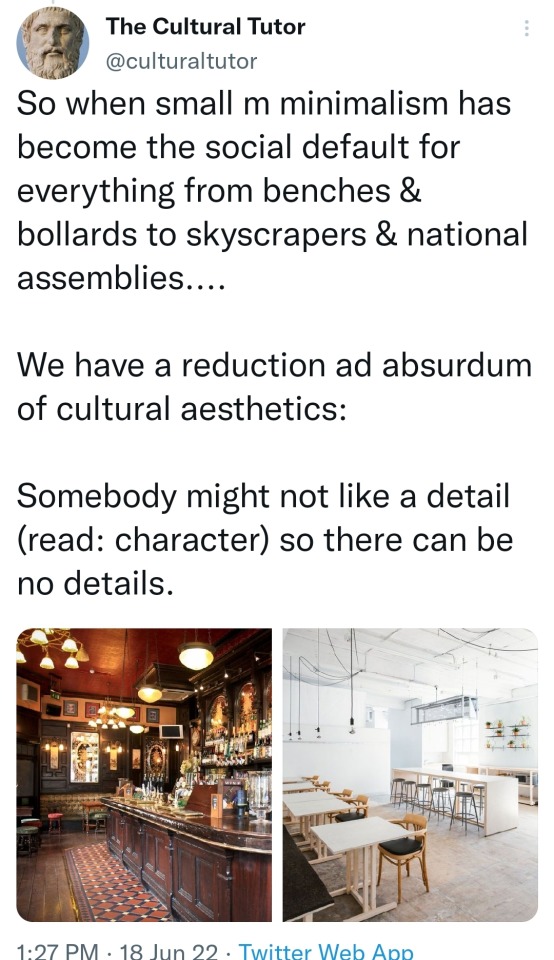


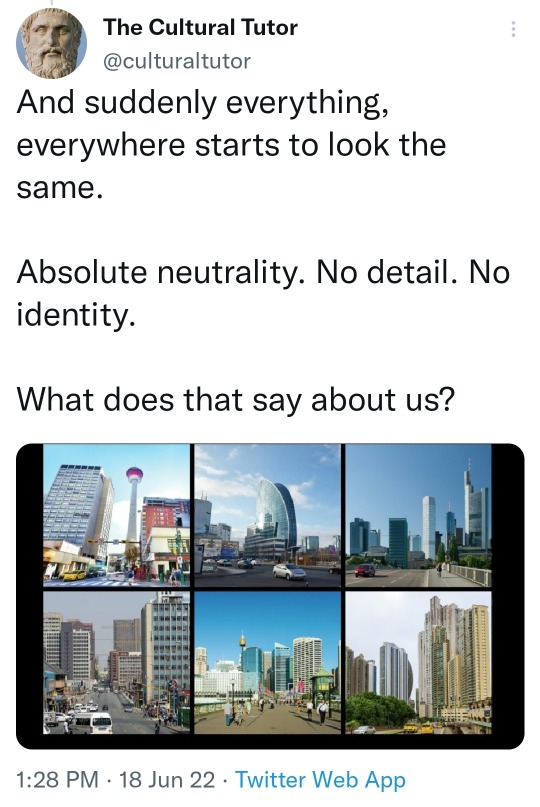
Perhaps minimalist design is so prevalent because we no longer have anything to say.
The Cultural Tutor
49K notes
·
View notes
Text
Zara chowdhary violence between Hindus and Muslims.....the Baha'i center told me if I have extreme aversions to Hindus practice like veganism or fasting or any type of self restriction that the northern Irish wars and migrant jails between white protestantism and European Catholicism is more what I experience
I notice it is more populated Muslim areas like Milwaukee Wisconsin in its corporate function with Chicago and Sikhism and any type of vegan spirit is evil and has to be excorcised
They believe in science and victorian dogma is insanity
If I was around the Hindus in San Diego...they to me appear to be fading like any religion and fill their function obligatorily....but don't ask for a lot of importance ..
If it's Hindus I around the hare Krishna center was very frightened of helicopters though if it's Arizona to Mogadishu the type of gq ultimate terrorist with his helicopter frightens me
If it's Muslims if it's British Pakistan if your going to be a creepy wants to be paranoid with pound cost of living to dollars earned just get away from me
If it's British Pakistan and their buy it just get away from me
Inflated jobs and voodoo.....if your going to inflate wages just to get paranoid get away from me
If it's Indian Muslims or Afghanistan Muslims if their suppose to bring me aspects of the international company I cannot do they do do that
British Pakistan......tells me they have understood my modernity as in absentia i.a.....but never delivers any required product adjustment or lesson...
The Hindus I think are more indigenous then Indian because they will follow take care of treaties to militant related issues my birth fathers friends were Vietnam veterans and I don't know that under those p.o.w. agreement sanctions
Poor white people should have obligations to reform and take care of the criminal aspects of life....I think the Hindus about reform explain to me to understand many wardens as finally who was good to them they were Hindus
You can't really find information on European concentrations and the Jewish myth that exists without western indoctrination unless it's Hindus
Food not bombs is really commercialized
Ikea...that's bad decisions though
I think there was a lot of muslim vanity that they are who truly believes in all the semitisms...that they believe in Jews and Christ and Muhammed....so I think it's actually a Hindus temple site because it's Hindus that truly does believe in Jews like Jesus
White protestantism...this is new and the old restrictions are not necessary...so if I'm around Catholicism it's those people will still stand and kneel in practice just to cure a pain that is already cured immediately by belief
You need to believe that Jesus saves you through faith no matter what Jesus loves you
And you don't have to read and write you can go to mother God right now
And I was told that was bad and that I have to do penance to strict good actions to accomplish better and now I feel like a snobby prude
Tough love from Catholic government I don't appreciate neck injuries to the little lambs or myself
Heshmat personal chef.....or hash brown...she kept calling him hash brown...
When it comes to infectious disease I am frightened of criminals that have been detained so long that they may spread something in reckoning
And that's if you meet alternate indie characters that need to be taken care of the Hindus can save us not Muslims
There is apparently some allegation the Muslim influance in northern areas could legislate preventatively and was in some way incapable or negligent....
I couldn't make it to the Muslim mosque in Temecula California because there were these construction blockades....
But the Afghanistan business aspects showed me simple remedies in cognitive science to free me from Jewish types that defect in ways to nazism and admit blood thirst
If it's them paranormal attacks are best remedied by where I come from and habits I have always known to do....
Hair not hair...why does it matter....
The vampire lady at the Jewish respite wanted me to believe in men in black all around me....and I find that metaphor about the vermis part of the brain and desires to gas me as a rodent
If it's business around Muslims it's very different cognitive points on my head that are a lot more important to my dental health and parasympathetic function
So I would say they do believe in Jesus though and hidden files on concentrated Jews
No if I was attacked at community meals by very bad addicts the church produces football.....and I blame my uncle the Greek ..
Its my uncles....that are veterans and they could have organized a long time to exercise more trade social control over male conduct that will traitor to idi amin like dictatorship and wouldn't do anything
Its been my whole life that the church does not take any responsibility about wanting to enlist males for sport ability not social conscience
0 notes
Text
A short history of pop music


Ariana Grande A short history of pop music, from blues, soul, gospel and jazz music, through rock, hip hop, funky and disco to modern commercial, and rap music. And now that is summer time you can visit our page about The most beautiful summer songs from 1960 to 2024, many famous of them in Italian! Music washes away from the soul the dust of everyday life. Berthold Auerbach One good thing about music, when it hits you, you feel no pain.” Bob Marley The only truth is music. Jack Kerouac Without music, life would be a mistake. Friedrich Nietzsche If I had my life to live over again, I would have made a rule to read some poetry and listen to some music at least once every week. Charles Darwin Music makes one feel so romantic – at least it always gets on one’s nerves – which is the same thing nowadays. Oscar Wilde Without deviation from the norm, progress is not possible. Frank Zappa Music... can name the unnameable and communicate the unknowable. Leonard Bernstein After silence, that which comes nearest to expressing the inexpressible is music. Aldous Huxley Where words leave off, music begins. Heinrich Heine To understand where pop music comes from we have to start from Blues. This is a genre and musical form that originated in African-American communities in the ��Deep South” of the United States around the end of the 19th century. The genre developed from a fusion of traditional African music and European folk music, that incorporated spirituals, work songs, field hollers, shouts and chants, and rhymed simple narrative ballads.

A short history of pop music The blues form, ubiquitous in jazz, rhythm and blues and rock and roll, is characterized by the call-and-response pattern, the blues scale and specific chord progressions, of which the twelve-bar blues is the most common. The blue notes (or “worried notes”) which are often thirds or fifths which are flatter in pitch than in other music styles, are also an important part of the sound. Blues shuffles or walking bass reinforce the trance-like rhythm and form a repetitive effect called a groove. The origins of the blues are also closely related to the religious music of the Afro-American community, the spirituals. The first appearance of the blues is often dated to after emancipation of slavery and, later, the development of juke joints. It is associated with the newly acquired freedom of the former slaves. Chroniclers began to report about blues music at the dawn of the 20th century. The first publication of blues sheet music was in 1908. Blues has since evolved from unaccompanied vocal music and oral traditions of slaves into a wide variety of styles and subgenres. Blues subgenres include country blues, such as Delta and Piedmont, as well as urban blues styles such as Chicago and West Coast blues. World War II marked the transition from acoustic to electric blues and the progressive opening of blues music to a wider audience, especially white listeners. In the 1960s and 1970s, a hybrid form called blues rock evolved. Now we can pass to soul music. This is also a genre of African American popular music that led to many later genres, from funk and dance music to hip hop and contemporary R&B. It developed in the USA in the late 1950s from African American church music called “gospel music”. After slavery ended in 1865, African Americans weren’t welcome in the churches of white Americans, so they built their own churches and sang Christian songs with African-American vocal styles and rhythms. They sang joyful, up-tempo gospel songs while clapping and moving to the beat, and they sang slower gospel songs that expressed deep feelings like yearning for God’s love. These different styles led to the two main styles of soul music. https://www.youtube.com/watch?v=a3w8I8boc_I The first soul songs were created when gospel songs were changed into secular songs by rewriting the lyrics. Joyful, up-tempo gospel songs became up-tempo soul songs, while slower gospel songs became romantic love songs. An example of the up-tempo style is R&B artist Ray Charles’ 1954 song I’ve Got a Woman (Way Across Town), a secular version of the old gospel song I’ve Got a Savior (Way Across Jordan). Another example is Ray’s first crossover hit What’d I Say in which he uses a gospel-music call and response to exchange sexy “oohs” and “aahs” with the Raelettes, his female backing singers. An example of the slower style is former gospel singer James Brown’s 1956 song Please, Please, Please in which he changed a gospel song about yearning for God’s love into a song about yearning for a girl’s love. In 1930s in Europe swing became popular. Benny Goodman and his Orchestra were the 'King of the Swing', as were Glenn Miller and Artie Shaw. The music was fast and frantically paced and led to dances being banned from dance halls, as the young women being flung into the air by their partners showed their stocking tops and underwear. Jazz continued to be popular. In 1940s, in Europe the Second World War brought fast, frantic (and often American) dance music - boogie-woogie or jitterbug. Dances were held in church halls, village halls, clubs, Air Force bases - everywhere! But slower, romantic songs were also popular as loved ones went away to fight, such as Vera Lynn's 'We'll Meet Again' and the song about coming home again, 'The 'White Cliffs of Dover'. After the war 'skiffle' bands became popular. These bands used household items, such as washboards and tea chests, as part of their set of instruments! Tommy Steele, who later became very famous, first played in a skiffle band. Obviously we couldn’t imagine pop music without Soul-Jazz, which was the most popular jazz style of the 1960s. It differs from bebop and hard bop (from which it originally developed) in that the emphasis is on the rhythmic groove. Although soloists follow the chords as in bop, the basslines (often played by an organist if not a string bassist) dance rather than stick strictly to a four-to-the bar walking pattern. The musicians build their accompaniment around the bassline and, although there are often strong melodies, it is the catchiness of the groove and the amount of heat generated by the soloists that determine whether the performance is successful. Soul-jazz’s roots trace back to pianist Horace Silver, whose funky style infused bop with the influence of church and gospel music, along with the blues. Other pianists who followed and used similar approaches were Bobby Timmons, Junior Mance, Les McCann, Gene Harris, and Ramsey Lewis. With the emergence of organist Jimmy Smith in 1956, soul-jazz organ combos (usually also including a tenor, guitarist, drummer, and an occasional bassist) caught on, and soulful players became stars.

Taylor Swift And now we can finally talk of ‘Pop’ that is the short term for popular music. There are different styles of pop music, but they all appeal to the general public. But when did ‘modern’ pop music begin? There were two significant moments. First of all Leo Fender invented the electric guitar in 1950. Then, in 1954, Sony introduced the transistor radio and after that, music was accessible to people in their homes and cars. In 1954 Elvis Presley released That’s All Right. He fused country music with black rhythm and blues to create rock and roll. At that time this was an innovation, and Elvis, who was young, attractive and exciting, became the first teen idol and made pop music a youth culture. Rock and Roll was born and it became soon very popular. The 1960s was the decade of The Beatles, who dominated pop music from 1961 to 1970 with a new folk-rock sound. The Beatles were the first band to play in a stadium: Shea Stadium in New York in 1965. In June 1969 they had their seventeenth number one hit – two more than Elvis. The 60s also saw the first outdoor music festivals and popular music began to have a social and political message, for example, Bob Dylan. This was also the beginning of Motown and soul music with artists like Ray Charles, The Supremes and Marvin Gaye. The Beatles began their career. They leapt to fame in 1963 with 'Please, Please Me'. The Beatles moved through the late 1960s as favourites of the 'flower power' generation - many young people enjoyed 'hippie' music. Other teenagers preferred the music of the 'Mods' - ska music and The Who. Next came the 1970s and several new genres of music appeared, like reggae (Bob Marley), glam rock (David Bowie), punk (the Sex Pistols) and heavy metal (Iron Maiden). When the Bee Gees recorded Saturday Night Fever, a new global dance phenomenon was born: disco. Michael Jackson’s Thriller video started the trend for using video as promotion and during the 1980s the influence of MTV meant that the video became as important as the song itself. Madonna exploded onto the scene, and with her ability to adapt to every trend, is now a pop icon. In England the first big new sound of the 1970s was “Glam Rock”, the main figures of this were David Bowie, Elton John and of course Gary Glitter. In the bleak political backdrop, these larger that life British bands and characters brought a welcome relief with their platform boots, sequins, nail varnish and colourful hair. This period also saw the spring of the punk movement of the late 1970s. Great British bands of this scene were The Sex Pistols and The Clash. The Punk style was Mohicans, bondage clothes, safety pins, piercings and bovver boots. http://www.youtube.com/watch?v=SHoHIL2ABVQ The 80s was the era of indie music from bands like The Smiths, The Cure and New Order. This decade also saw the first ‘raves’ when disco transformed into high energy dance music. The 1980s saw also the rise of hip hop and rap music, with American influences powerful once again in the form of such groups as Run DMC and Grandmaster Flash and the Furious Five. It also saw the rise and fall of the 'New Romantics', typified by groups like Adam and the Ants, who dressed as pirates and highway men and wore huge amounts of makeup. From the late 80s, through the 1990s and into the first part of the 21st century, other musical styles appeared. Grunge (Nirvana), RnB (Beyoncé), rap and hip hop (Eminem, Ice-T, 2Pac, Black Eyed Peas), new rock (The White Stripes) showed that pop music is always evolving. The 90s onwards was also the era of boy bands and girl bands such as Take That and The Spice Girls. Britpop, this was the general name given in the 1990s to a new wave of successful British bands who made a big impact in the United States and Europe, as well as in England. The most successful have been Radiohead, Oasis, Blur, Pulp, Massive Attack and The Spice Girls. Today pop is a global industry. CDs replaced records a long time ago and nowadays, downloading from websites is marking the end of these traditional music formats. It is now the age of digital music. In 2006 Gnarls Barkley with his song Crazy became the first artist to reach number 1 in the UK charts based only on download sales. In Europe, Britain is certainly more famous for pop music than it is for classical composers or jazz musicians. Names such as The Beatles, the Rolling Stones, Led Zeppelin, Pink Floyd, Elton John, George Michael and The Spice Girls are known world wide but little do people know of our other musicians not in the pop world. In Britain, most youths listen to punk, garage, house, rock, pop and R&B. (such as McFly, JLo, Xtina, Beyonce, Pink, Britney, Justin Timberlake, Mis-teeq). Nowadays the internet has also revolutionized the way music is being consumed. Including all video and music streaming, internet-based music consumption was the primary choice for 64% of respondents to a recent survey. That’s not even accounting for livestreams or music purchased through the internet. This internet-heavy metric is being reflected on the business side as well, with 75% of the music industry’s revenues in the U.S. coming from streaming. However, for artists, streaming revenue is usually the third-biggest earner after live performances and sales. But utilizing streaming to its fullest potential keeps modern artists in the loop. For example, Beyoncé was one of the first artists to utilize streaming platforms to release an album completely unannounced in 2013, a marketing move that has been replicated many times since. Data is from 2022 and is sourced from a survey of over 44,000 people from 22 countries by IFPI that asked people their primary mode for consuming music, so it highlights global music consumption habits. As of 2022, paid subscription services (i.e. Apple Music, Spotify) are the most preferred option for listeners, accounting for nearly one-fourth of main platform share. 1) Paid Audio Streaming 24% Spotify, Apple Music; 2) Video Streaming 19% YouTube; 3) Radio 17%; 4) Purchased Music 10% Vinyls, CDs, purchased digital albums; 5) Ad-Supported Audio Streaming 8% Amazon, Deezer; 6) Short-form Videos 8% TikTok; 7) Social Media Videos 5% Facebook, Instagram; 8) Live Music 4% concerts, livestreams; 9) Other 6% music on TV, phone-to-phone transfers. https://www.youtube.com/watch?v=rEXUQpffn2k And now to conclude this article I would spend a few words on Lounge music that is a type of easy listening music, popular in the 1950s and 1960s. It may be meant to evoke in the listeners the feeling of being in a place, usually with a tranquil theme, such as a jungle, an island paradise or outer space. The range of lounge music encompasses beautiful music–influenced instrumentals, modern electronica (with chillout, and downtempo influences), while remaining thematically focused on its retro-space age cultural elements. The earliest type of lounge music appeared during the 1920s and 1930s, and was known as light music. Lounge music often incorporates smooth, relaxed instrumentation which can also be found in pop music, especially in more mellow or soft pop tracks. The use of electronic elements, synthesizers, and smooth vocals is common in both genres. Many artists create music that can be classified under both lounge and pop genres. These artists often blend elements from both styles to create a unique sound. Both genres aim to create a specific mood or atmosphere. Lounge music is typically designed to be soothing and relaxing, which can be a characteristic of some pop music as well, especially ballads and softer tracks. Lounge music, particularly in its more modern forms, often aims to have broad appeal, similar to pop music. This includes catchy melodies, accessible arrangements, and production that appeals to a wide audience. Pop songs are frequently remixed into lounge versions, and lounge tracks can be covered or adapted into pop formats. This interchangeability highlights the fluid boundaries between the two genres. Both genres are frequently used as background music in various settings, such as cafes, bars, and stores, where creating a pleasant atmosphere is key. Lounge music, particularly from the mid-20th century, has influenced the development of pop music. The lush orchestrations and smooth styles of early lounge music have found their way into the arrangements and production techniques of modern pop music. Genres like chillwave, downtempo, and nu jazz often blend elements of lounge and pop, creating music that is both relaxing and catchy. Music expresses that which cannot be put into words and that which cannot remain silent. Victor Hugo Music is a moral law. It gives soul to the universe, wings to the mind, flight to the imagination, and charm and gaiety to life and to everything. Plato If music be the food of love, play on. William Shakespeare There are two means of refuge from the misery of life - music and cats. Albert Schweitzer The only truth is music. Jack Kerouac Everything in the universe has a rhythm, everything dances. Maya Angelou You can also visit these other pages:

Drive and listen Drive around cities while listening to their local radios Listen to local radio stations while driving through the cities around the world. Drive & Listen. Entertainment Music and Dancing Best summer songs Free Internet Radios Best Christmas Songs Christmas Songs Read the full article
#amazonmusic#American#commerical#Concerts#contemporaryR&B#gospel#groove#hiphop#indie#Industry#livemusic#loungemusic#musichistory#popular#Radio#rap#Rock#soul#Spotify#streaming#summerhits#TikTok#youtube
1 note
·
View note
Text
MADAME X TOUR (2019)
The theater tour played in only 7 cities across North America and 3 in Europe. It featured multiple nights of shows in each city. The tour kicked off in New York City on September 17, 2019. After a mini residency of 16 nights, the tour visited Chicago, San Francisco, Las Vegas, Los Angeles, Philadelphia, to end in Miami before Christmas. The European leg kicked off in Lisbon in January 2020, followed by tour dates in London and Paris. The tour was plagued by issues from the start. Firstly, there were planning issues and technical issues, resulting in a later start of the tour, several reschedulings and a few cancellations. Secondly, Madonna suffered from a serious injury, after a fall during rehearsals. This caused 5 dates in the US to be cancelled (including all 3 Boston dates), and 9 shows in Europe. Thirdly, the final two dates of the tour were forced to be cancelled amid the health crisis caused by the Corona Covid19 virus. The tour ended on March 8, 2020 with 75 shows performed (out of 93 originally scheduled). The show put a strong emphasis on the new album, with no less than 12 Madame X songs in the setlist. Several older songs were cut short to only a verse or chorus. Madonna also included some Fado songs that inspired her for the album. She took advantage of the intimate setting to have several interactions with the audience throughout the show.
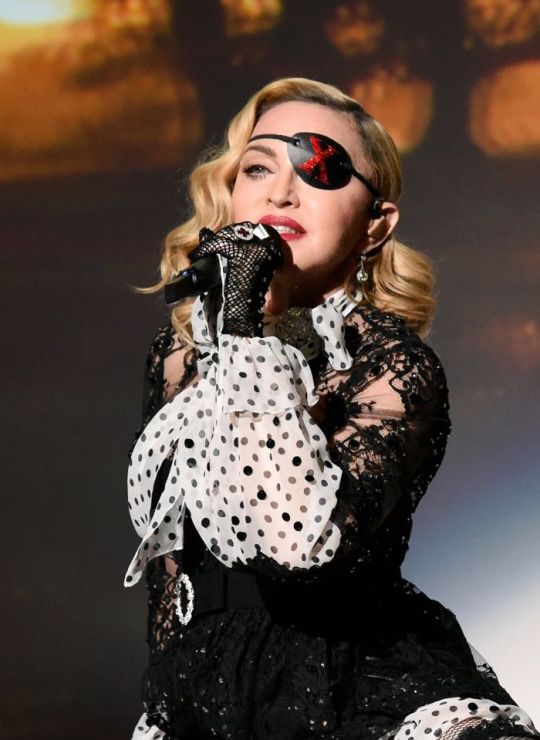
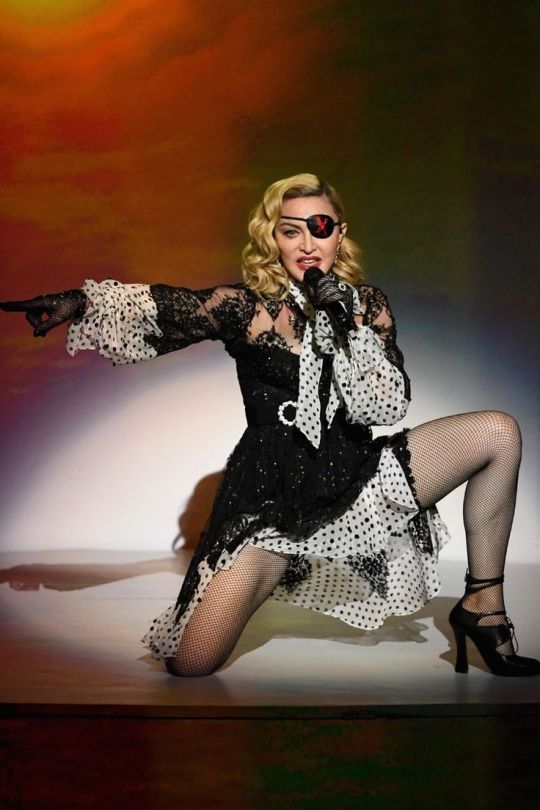
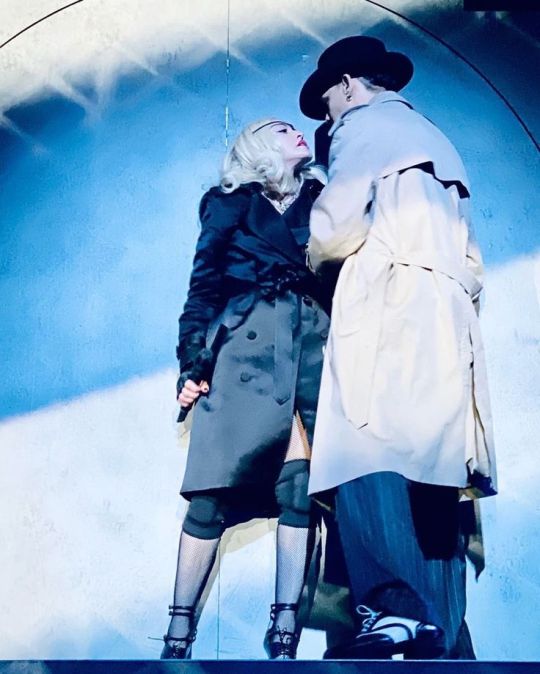

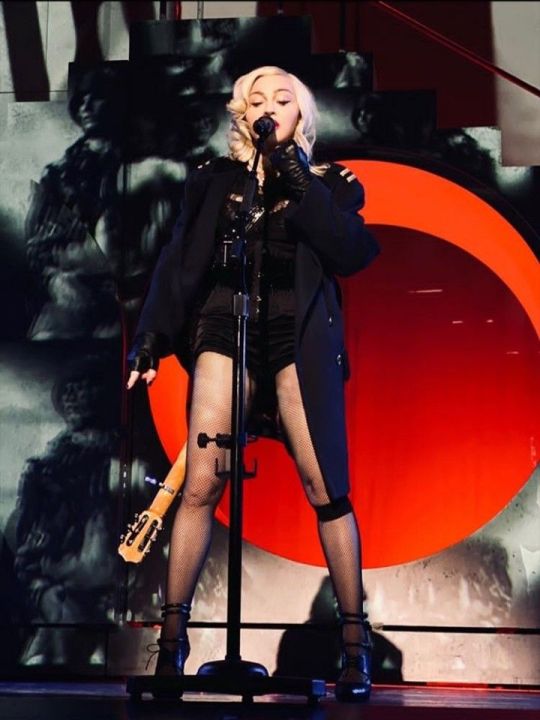
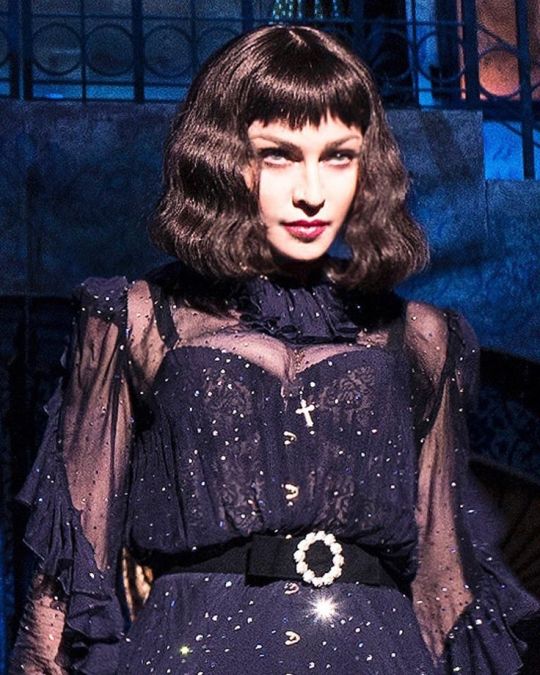
CONCERT SET LIST
Act I
"God Control"
"Dark Ballet"
"Human Nature"
"Express Yourself" (A cappella chorus)
"Papa Don't Preach" (String intro)
Act II
"Madame X Manifesto" (Video interlude)
"Vogue"
"I Don't Search I Find"
"Papa Don't Preach"
"American Life"
Act III
"Batuka" (with video introduction)
"Fado Pechincha" (Isabel De Oliveira cover)
"Killers Who Are Partying"
"Crazy"
"Welcome to My Fado Club" (Contains elements of "La Isla Bonita")
"Sodade" (Cesária Évora cover)
"Medellín"
"Extreme Occident"
Act IV
"Rescue Me" (Dancers interlude)
"Frozen"
"Come Alive"
"Future"
Act V
"Crave" (Tracy Young Remix)
"Like a Prayer"
Encore
"I Rise"
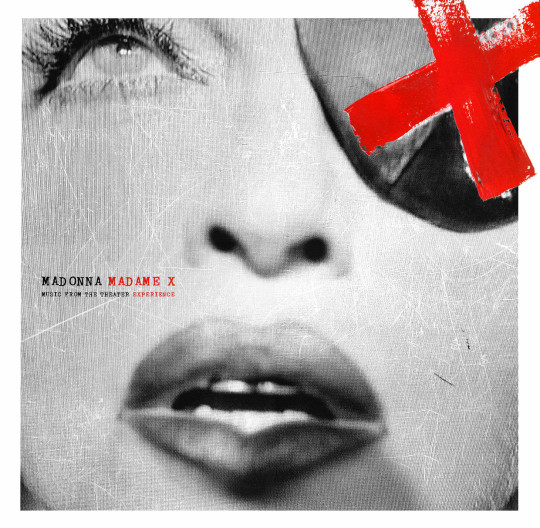
Madame X - Music from the Theater Experience
TRACKLIST
1. God Control (Live) 2. Dark Ballet (Live) 3. Human Nature (Live) 4. Vogue (Live) 5. I Don't Search I Find (Live) 6. American Life (Live) 7. Batuka (Live) 8. Fado Pechincha (feat. Gaspar Varela) (Live) 9. Killers Who Are Partying (Live) 10. Crazy (Live) 11. Welcome to My Fado Club (Live) 12. Sodade (feat. Dino d'Santiago) (Live) 13. Medellín (Live) 14. Extreme Occident (Live) 15. Frozen (Live) 16. Come Alive (Live) 17. Future (Live) 18. Crave (Live) 19. Like a Prayer (Live) 20. I Rise (Live)
0 notes